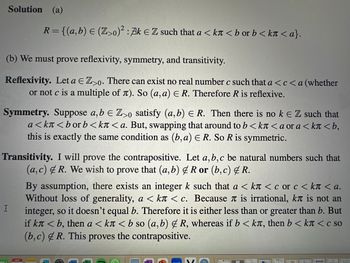
Advanced Engineering Mathematics
10th Edition
ISBN: 9780470458365
Author: Erwin Kreyszig
Publisher: Wiley, John & Sons, Incorporated
expand_more
expand_more
format_list_bulleted
Question
Are there any other ways to prove transitivity in this question
Thanks :)

Transcribed Image Text:Solution (a)
R = {(a,b) = (Z>0)²: Ak € Z such that a <kr < b or b < kn <a}.
(b) We must prove reflexivity, symmetry, and transitivity.
Reflexivity. Let a E Z>o. There can exist no real number c such that a <c<a (whether
or not c is a multiple of л). So (a, a) E R. Therefore R is reflexive.
Symmetry. Suppose a, b € Z>o satisfy (a,b) E R. Then there is no k € Z such that
a<kл<bor b<kл <a. But, swapping that around to b<kл<a or a <kл <b,
this is exactly the same condition as (b, a) E R. So R is symmetric.
Transitivity. I will prove the contrapositive. Let a, b, c be natural numbers such that
(a, c) R. We wish to prove that (a, b) & R or (b, c) & R.
I
By assumption, there exists an integer k such that a < kл < с or с <kл <a.
Without loss of generality, a < kл < с. Because л is irrational, kл is not an
integer, so it doesn't equal Therefore it is either less than or greater than b. But
if kл <b, then a <kл<b so (a,b) & R, whereas if b < kë, then b <kл < c so
(b,c) R. This proves the contrapositive.
Expert Solution
This question has been solved!
Explore an expertly crafted, step-by-step solution for a thorough understanding of key concepts.
Step by stepSolved in 3 steps

Knowledge Booster
Similar questions
- Please can you provide the answers just as it was asked in the question? I have tried submitting using several formats but it was marked wrong in webassign. This is a homework that is taking all my time right now.arrow_forwardProve: bd (s) = 5 TR-S bd (s) is a closed setarrow_forwardTranslate the logical equivalence TAFV¬(T V F) = F into an identity in Boolean algebra O 1·0 + (0 + 1) = 0 O 1·0+ (0+ 1) = 0 O 1·0+ (1+ 0) = 0 O 1·0 + (0 + 1) = 0arrow_forward
- Dedekind Cuts Notes from Principles by Rudin Definition A set ack is a cut if LA I) a contains at least one rational number but not every rational, (II) If pea, qarrow_forwardFind he alative morima and minima, H any tar the fuechon If there is not an answer wite /A Wade ms wefo as albered paics.arrow_forward8. Suppose the variables x and y represent real numbers, and L(x, y) : x < y, Q(x, y) : x = y, E(x) : x is even, I(x) : x is an integer. Write the statement using these predicates and any needed quantifiers. a) Every integer is even. b) If x < y, then x is not equal to y. c) There is no largest real number.arrow_forward
- Use the following definitions and the laws of logic to prove the following statement. • Definition of Cartesian product: (x, y) E Ax B + (x€ A) ^ (y E B) • Definition of union: x E AUB → (x E A) V (x € B) Statement. For any sets A, B, C, A × (BUC) = (A × B) U (A × C).arrow_forwardWhat is the size of the symmetric difference of two finite sets A and B, that is AA BI ? o IIAI - |B|| O IAl +|B| – 2|A B| O IAl +|B| – |AN BỊ O IA| + |B|arrow_forwardShow that CC R" is closed if and only if bdry (C) C C.arrow_forward
arrow_back_ios
arrow_forward_ios
Recommended textbooks for you
 Advanced Engineering MathematicsAdvanced MathISBN:9780470458365Author:Erwin KreyszigPublisher:Wiley, John & Sons, Incorporated
Advanced Engineering MathematicsAdvanced MathISBN:9780470458365Author:Erwin KreyszigPublisher:Wiley, John & Sons, Incorporated Numerical Methods for EngineersAdvanced MathISBN:9780073397924Author:Steven C. Chapra Dr., Raymond P. CanalePublisher:McGraw-Hill Education
Numerical Methods for EngineersAdvanced MathISBN:9780073397924Author:Steven C. Chapra Dr., Raymond P. CanalePublisher:McGraw-Hill Education Introductory Mathematics for Engineering Applicat...Advanced MathISBN:9781118141809Author:Nathan KlingbeilPublisher:WILEY
Introductory Mathematics for Engineering Applicat...Advanced MathISBN:9781118141809Author:Nathan KlingbeilPublisher:WILEY Mathematics For Machine TechnologyAdvanced MathISBN:9781337798310Author:Peterson, John.Publisher:Cengage Learning,
Mathematics For Machine TechnologyAdvanced MathISBN:9781337798310Author:Peterson, John.Publisher:Cengage Learning,


Advanced Engineering Mathematics
Advanced Math
ISBN:9780470458365
Author:Erwin Kreyszig
Publisher:Wiley, John & Sons, Incorporated

Numerical Methods for Engineers
Advanced Math
ISBN:9780073397924
Author:Steven C. Chapra Dr., Raymond P. Canale
Publisher:McGraw-Hill Education

Introductory Mathematics for Engineering Applicat...
Advanced Math
ISBN:9781118141809
Author:Nathan Klingbeil
Publisher:WILEY

Mathematics For Machine Technology
Advanced Math
ISBN:9781337798310
Author:Peterson, John.
Publisher:Cengage Learning,

